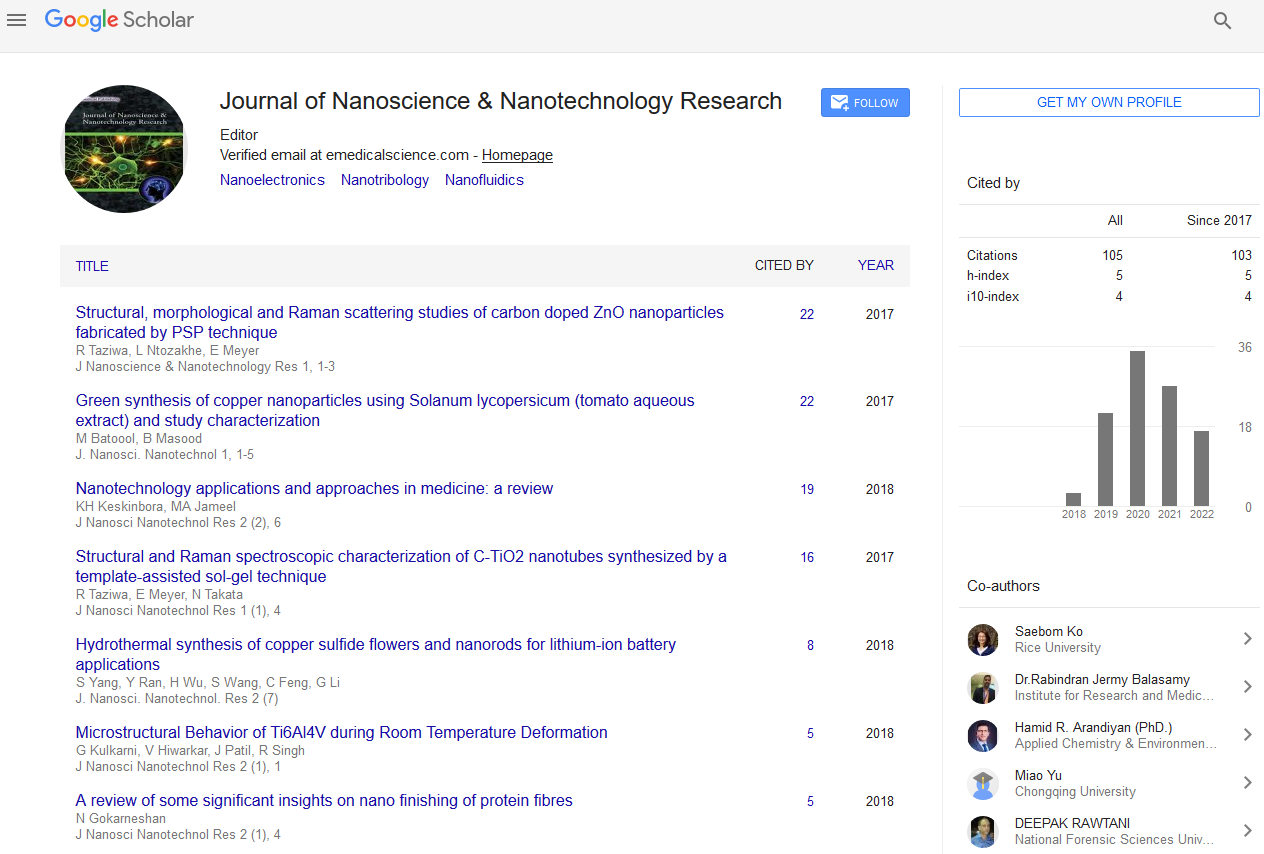Short Communication - (2024) Volume 8, Issue 3
DNA Nanotechnology: Unlocking the Potential of Nature’s Blueprint
Chong Rae Park*
Department of Chemical Engineering, National Cheng Kung University, Taiwan
*Correspondence:
Chong Rae Park,
Department of Chemical Engineering, National Cheng Kung University,
Taiwan,
Email:
Received: 02-Sep-2024, Manuscript No. ipnnr-24-21763;
Editor assigned: 04-Sep-2024, Pre QC No. ipnnr-24-21763 (PQ);
Reviewed: 18-Sep-2024, QC No. ipnnr-24-21763;
Revised: 23-Sep-2024, Manuscript No. ipnnr-24-21763 (R);
Published:
30-Sep-2024, DOI: 10.12769/IPNNR.24.8.30
Introduction
DNA nanotechnology is an innovative field that merges principles
of molecular biology and nanotechnology to manipulate DNA
molecules for the development of new nanoscale structures
and devices. This interdisciplinary approach leverages the
unique properties of DNA, the fundamental building block of
life, to create novel applications in areas such as medicine,
materials science, and biosensing. By utilizing DNA’s inherent
ability to self-assemble and its versatility as a molecular
scaffold, researchers are opening new frontiers in the design
of complex nanostructures that could revolutionize various
scientific disciplines. At the core of DNA nanotechnology is
the remarkable ability of DNA to form specific base pairings,
which enables it to act as a programmable material. The
complementary nature of DNA strands allows for precise
design and assembly of nanostructures. Scientists can design
DNA sequences that will bind together in specific ways, creating
intricate shapes such as nanorobots, scaffolds, and even DNA
origami. This self-assembly capability is akin to nature’s own
construction process, allowing for the creation of well-defined
nanoscale structures that can perform targeted functions.
Description
One of the most exciting applications of DNA nanotechnology
lies in the field of drug delivery. Traditional drug delivery
methods often face challenges, such as poor solubility and
unintended side effects. DNA nanostructures can be engineered
to encapsulate drugs and deliver them directly to targeted
cells, enhancing therapeutic efficacy while minimizing side
effects. For instance, researchers have developed DNA-based
nanoparticles that can carry anticancer drugs and release
them only in the presence of specific biomarkers associated
with tumor cells. This targeted approach ensures that drugs
are delivered precisely where they are needed, increasing
their effectiveness and reducing toxicity to healthy tissues. In
addition to targeted drug delivery, DNA nanotechnology holds
great promise in the realm of diagnostics. DNA nanostructures
can be designed to recognize specific biomolecules, such as
proteins or nucleic acids, enabling highly sensitive detection of
diseases. These sensors can play a crucial role in ensuring safe
drinking water and protecting ecosystems from contamination.
Despite its vast potential, DNA nanotechnology also faces
several challenges. One significant hurdle is the scalability
of producing DNA nanostructures in a cost-effective manner.
While laboratory techniques have advanced significantly,
translating these methods into large-scale production remains
a challenge. Additionally, concerns regarding the stability and
biocompatibility of DNA nanostructures must be addressed
before they can be widely adopted in clinical settings.
Researchers are actively working on these challenges, seeking
to optimize the design, production, and application of DNA
nanostructures for practical use [1-5].
Conclusion
In conclusion, DNA nanotechnology is a ground breaking
field that combines the principles of molecular biology
and nanotechnology to unlock the potential of DNA as a
versatile material. Its applications in targeted drug delivery,
diagnostics, advanced materials and environmental monitoring
promise to revolutionize various sectors and improve human
health. As researchers continue to explore and refine DNA
nanotechnology, the possibilities are limitless. By harnessing
the power of nature’s blueprint, scientists are paving the
way for innovations that could reshape our understanding of
biology and material science, ultimately leading to improved
healthcare outcomes and enhanced quality of life. As this
field evolves, it will be essential to address the challenges and
ethical considerations to ensure that the advancements in DNA
nanotechnology benefit society as a whole.
Acknowledgement
None.
Conflict Of Interest
None.
References
- Li F, Xiao M, Pei H (2019) DNA based chemical reaction networks. Chembiochem. 20(9):1105-1114.
[Crossref] [Google Scholar]
- Niranjan DN, Thiyagarajan D, Bhatia D (2022) DNA origami in the quest for membrane piercing. Chem Asian J. 17(19):e202200591.
[Crossref] [Google Scholar]
- Wang F, Zhang X, Liu X, Fan C, Li Q (2019) Programming motions of DNA origami nanomachines. Small. 15(26):e1900013.
[Crossref] [Google Scholar]
- Kankia B (2020) Quadruplex based reactions for dynamic DNA nanotechnology. J Phys Chem B. 124(21):4263-4269.
[Crossref] [Google Scholar]
- Arnon ZA, Piperno S, Redeker DC, Randall E, Tkachenko AV (2024) Acoustically shaped DNA-programmable materials. Sci Eng C. 97:397-405.
[Crossref] [Google Scholar]
Citation: Park CR (2024) DNA Nanotechnology: Unlocking the Potential of Nature’s Blueprint. J Nanosci Nanotechnol Res. 08:30.
Copyright: © 2024 Park CR. This is an open-access article distributed under the terms of the Creative Commons Attribution License, which permits unrestricted use, distribution, and reproduction in any medium, provided the original author and source are credited.

